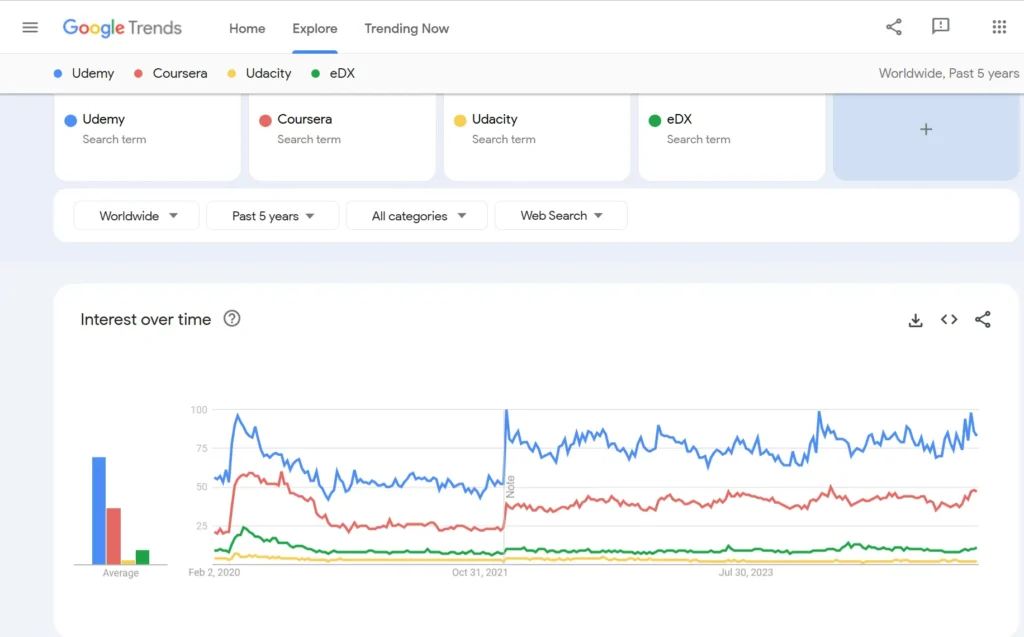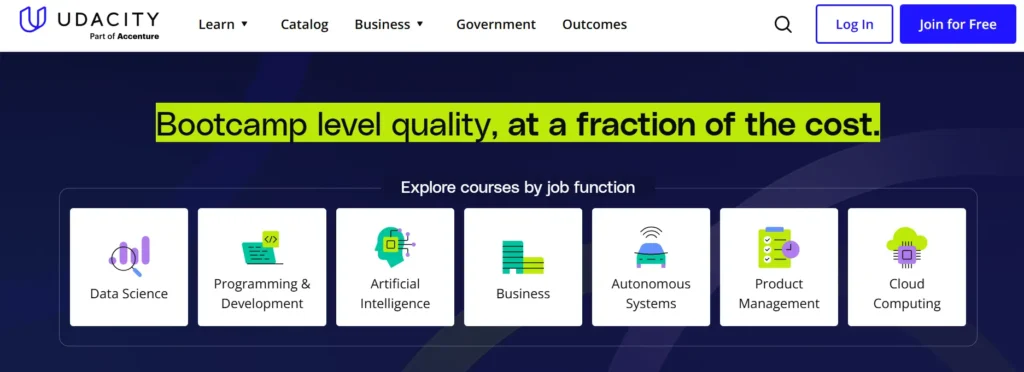
(Announcement: Hey everyone, before we dive into this article. Here is a great news – With the EOY sale, Coursera Plus is currently available with $200 off (50% discount) – valid globally – until December 29, 2025. And, if you’re from India, it’s only INR 7,499/year. Don’t miss out on this massive sale.)
Online Learning industry is rapidly growing. With the convenience of learning from your home and at your own pace, today, everyone wants to adopt this learning culture.
Whether you aim to acquire professional skills such as cybersecurity, project management, or soft skills like communication or time management, online learning can offer valuable and affordable opportunities.
Today, numerous online learning platforms are available, offering courses in various subjects.
In this article, I’ll compare the four most popular learning platforms: Udemy, Coursera, Udacity, and Edx, and evaluate which provides better courses in 2025 as they all offer courses mostly in similar subjects.
Ready?
Let’s dive into this guide…
Overview — Udemy vs. Coursera vs. Udacity vs. Edx
Udemy, Coursera, Udacity, and EdX are all popular learning platforms that offer courses across a variety of subjects, catering to diverse audiences.
Udemy, established in 2010, stands as one of the earliest learning sites. It provides both free and paid short-duration courses created by individuals proficient in various subjects.
Surprisingly, Udemy boasts a total of 210,000 courses across 13 fields, encompassing development, business, finance, marketing, health, lifestyle, music, teaching, and more.
Coursera, founded in 2012, ranks among the most popular learning platforms, offering courses and online degree programs from top universities and leading tech companies worldwide.
Coursera hosts over 8,000 courses spanning 11 different subjects, available in both free and paid formats.
Udacity, established in 2011, primarily focuses on in-demand tech fields, with courses crafted by industry experts.
Known as Nanodegrees, Udacity courses cover 500 offerings across 8 tech fields such as data science, programming, AI, business, and more, encompassing both free and paid options.
Lastly, Edx, also founded in 2012, parallels Coursera by offering courses and online degree programs from prestigious universities and tech companies worldwide.
Edx features over 4,000 courses predominantly centered on academic subjects and professional tech skills.
Now, let’s see which learning platform garners the most popularity among learners worldwide.
Which learning platform is most popular?
To determine the actual popularity of these learning platforms, I visited to Google Trends, set the time frame for the past 5 years, and selected the worldwide location.
The result?

Based on Google Trends data, Coursera seems as the top choice for learners worldwide, followed by Udemy, edX, and Udacity.
Additionally, research reveals that Coursera boasts over 124 million registered learners, while Udemy has 64 million registered learners globally.
This popularity discrepancy can be attributed to Coursera’s reputation for providing trustworthy, reliable, and enjoyable courses offered by top universities and tech giants like Google, IBM, Meta, and more.
Udemy vs. Coursera vs. Udacity vs. Edx — Which is best?
Determining the best learning platform hinges entirely on your individual learning goals and needs.
When comparing these platforms and their course offerings, you’ll discover unique features that you may appreciate about Udemy, while finding aspects to love about Coursera, Udacity, and edX.
Therefore, the optimal learning platform for you is the one that aligns closely with your specific requirements.
Drawing from personal experience, I’ll elucidate what sets Udemy, Coursera, Udacity, and edX apart from each other, highlighting reasons to consider and possibly overlook them for your learning journey.
Why Choose Udemy — Pros

You can choose Udemy for these reasons…
- Vast course selection: Udemy offers over 200,000 courses across a wide range of topics, from programming and design to business, marketing, and personal development.
- Affordable pricing: Courses on Udemy are typically much more affordable compare to Coursera, Udacity and Edx courses or degree programs.
- Expert instructors: Many courses are taught by industry experts, professionals, and experienced practitioners in their respective fields.
- Lifetime access: Once you enroll in a course, you have lifetime access to the course materials, allowing you to revisit the content whenever needed.
- Engaging content: Courses often include video lectures, quizzes, coding exercises, downloadable resources, and other interactive elements to enhance the learning experience.
- Frequent discounts and promotions: Udemy frequently offers discounts and promotions, allowing you to access high-quality courses at even more affordable prices.
Now, let me tell you some cons or limitations of Udemy…
Limitations of Udemy — Cons
Based on my personal experience, I have also discovered some limitations of Udemy. These are…
- Quality of courses may vary: With a variety of course creators and instructors on Udemy, it’s obvious that the quality of content, presentation types, video quality may vary.
- Certificates are not valid: After completing any course on Udemy, you receive a Certificate of Compliance, however, these certificates are not legally valid or accredited by any education institutions.
- No Career Support: Like Coursera, and Udacity, Udemy courses does not include any career support or any guidance such as Resume building, Optimizing LinkedIn profile for better engagement and find the job easily.
Overall, I found Udemy courses are great to learn skills but they certificates and lack of career support may not helpful enough for landing a job.
I’d also suggest you to enroll in courses that has got good reviews from users.
Why choose Coursera — Pros

Coursera is my all time favorite learning platform as it not makes the course so engaging with video, reading quizzes, flashcards, assignments but also provides valid certificates and badges to make your resume and LinkedIn profile impressive.
On Coursera, you can also save notes while watch a lecture, set learning goals, reminders, and more to stay on track with the courses you enroll in.
Here are the compelling reasons to choose Coursera…
- Courses offered by top universities and institutions: Coursera partners with renowned universities like Stanford, Yale, and institutions like Google, IBM, META and more to offer high-quality courses.
- Accredited degrees and certificates: In addition to individual courses, Coursera offers the option to earn accredited degrees and professional certificates from universities and companies.
- Specializations and Professional Certificates: Coursera’s Specializations and Professional Certificates allow you to gain in-depth knowledge and skills in specific domains. You must have heard about Google Career Certificates, these are part of Coursera Professional Certificates.
- Industry-relevant content: Courses are designed in collaboration with industry leaders, ensuring that the content is relevant and aligned with industry needs.
- Flexible subscription models: Coursera offers different subscription options, including a free option to audit many courses, as well as paid monthly or annual subscriptions.
- Financial aid and scholarships: Coursera provides financial aid and scholarship opportunities for learners who cannot afford the course fees.
- Career resources: Coursera offers career resources, such as resume writing guides and interview preparation, to help learners advance their careers.
Now let’s also take a look at the cons or limitations of Coursera…
Limitations of Coursera: Cons
- No life-time access to content: Paid programs such as professional certificates and specialization programs on Coursera do not offer any lifetime access.
- Lack of personalized feedback: While projects and assignments are included in Coursera’s paid programs, you do not receive personalized feedback in all programs from instructors.
If you also want to start your learning with Coursera, you can Coursera Plus, giving you access to over 7,000 courses on various subjects, including professional certificates and specialization programs.
Why choose Udacity — Pros

As I said earlier, Udacity offers courses in mostly in tech and in-demand fields.
Here are certain reasons to choose Udacity over Udemy, Coursera and Edx.
- Nanodegree programs: Udacity offers intensive Nanodegree programs in cutting-edge technologies like AI, data science, cloud computing, and more, designed in collaboration with industry leaders.
- Industry-relevant curriculum: The curriculum is designed and updated regularly in collaboration with industry experts to ensure relevance and alignment with current job market needs.
- Real-world projects and case studies: The curriculum includes real-world projects and case studies, providing practical experience and preparing learners for the job market.
- Personalized mentorship: Each Nanodegree program includes personalized mentorship from experienced professionals in the field.
- Career services: Udacity provides career services, including resume feedback, GitHub portfolio reviews, and career fairs, to help learners land their dream jobs.
Now let’s see the major cons or limitations of Udacity…
Limitations of Udacity — Cons
- No free-trial: Udacity does offer any free trial with of its paid courses or Nanodegree programs.
- Slightly Expensive: Compare to Udemy and Coursera, Udacity Nanodegree programs are little expensive. They are not easy to afford for every learners.
- No life-time access: Similar to Coursera, Udacity does not provide a life time access to any of its paid courses or Nanodegree programs.
Overall, Udacity is well-known for its high quality Nanodegree programs which are created by industry experts in collaboration with top companies.
The good thing about Udacity is it offers courses in mostly in-demand tech fields, making it a good choice for leaners who want to start a career in tech field.
Why choose Edx — Pros

Edx is also a well-known learning platforms that offers courses in mostly academic subjects, tech profession, and others created by top univerisites and institutions.
Similar to Coursera, you can also pursue online degree programs on Edx offered by top universities worldwide.
Here are the reasons to choose Edx for your online learning journey…
- World-class universities: EdX partners with prestigious universities like Harvard, MIT, UC Berkeley, and others to offer high-quality courses.
- Verified certificates: edX offers the option to earn verified certificates from partner universities, adding credibility to your learning.
- Cutting-edge content: Courses cover a wide range of subjects, including emerging fields like artificial intelligence, data science, and cybersecurity.
- Professional Certificates: EdX offers professional education programs, such as MicroMasters and Professional Certificate programs, designed to enhance career prospects.
- Open access: Many EdX courses are available for free, providing access to quality education for everyone.
Let’s look at the major cons or limitations of Edx…
Limitations of EdX — Cons
- Lack of users reviews: Like other learning platforms, you don’t find enough users reviews for most of the Edx courses or any professional certificates on Edx.
- No life-time access: Similar to Coursera, Edx paid certification program does not provide a life time access.
- Variable course quality: As courses are developed by various institutions and instructors, the quality and depth of content can vary across different courses.
- Limited hands-on experience: Some courses, especially in technical fields, may lack sufficient hands-on projects or practical exercises, which are crucial for skill development.
Final Verdict: Choosing the Best Learning Platform in 2025
After a thorough comparison of these online learning platforms Udemy, Coursera, Udacity, and edX, it’s clear that each platform offers unique advantages and limitations.
The best choice ultimately depends on your specific learning goals, preferences, and budget.
However, considering various factors such as course selection, quality, affordability, credibility, and additional resources, here’s my final verdict:
- Pros: Vast course selection across numerous topics, affordable pricing, expert instructors, engaging content, and frequent discounts.
- Cons: Quality of courses may vary, certificates lack accreditation, and no career support.
- Pros: Courses offered by top universities and institutions, accredited degrees and certificates, industry-relevant content, flexible subscription models, financial aid opportunities, and career resources.
- Cons: Paid programs lack lifetime access, and personalized feedback might be limited.
- Pros: Nanodegree programs in cutting-edge technologies, industry-relevant curriculum, real-world projects, personalized mentorship, and career services.
- Cons: No free trial, slightly expensive compared to other platforms, and no lifetime access to paid courses.
Edx:
- Pros: Partnerships with world-class universities, verified certificates, cutting-edge content, professional certificates, and open access to many courses.
- Cons: Lack of user reviews for courses, no lifetime access to paid certification programs, variable course quality, and limited hands-on experience in some technical fields.
Considering the overall offerings and popularity among learners worldwide, Coursera emerges as the top choice for online learning in 2025.
With its extensive course catalog, partnerships with prestigious institutions, accredited certifications, industry-aligned content, flexible subscription options, and career resources, Coursera provides a comprehensive and reliable platform for learners of all levels and interests.
If you also find Coursera as a valuable resource in your learning and career development journey, don’t let this discount slip out through your fingers.
However, it’s essential to evaluate your individual preferences, budget constraints, and learning objectives before making a decision.
Each platform has its strengths and weaknesses, and the best choice is the one that aligns most closely with your needs and aspirations.
Conclusion:
In the choice between Udemy, Coursera, Udacity, and edX, selecting the most suitable platform hinges on your learning objectives and preferences.
If you aim to pursue a hobby such as photography while keeping costs low, Udemy courses offer a viable option.
For those seeking to acquire professional skills from renowned universities and leading tech companies, particularly for job and career advancement, Coursera programs present an excellent choice.
If your focus is on learning in-demand tech skills from industry experts through real-world projects, Udacity Nanodegree programs offer a compelling pathway.
Alternatively, individuals interested in academic courses or online degree programs may find Edx to be the ideal fit.
Now, I’d like to know:
Which learning platform are you inclined to choose?
If you have any questions or thoughts regarding these learning platforms, please feel free to share them in the comments.
Happy Learning!
(To support my writing, I may use affiliate links in this post. Rest assured, they do not affect my reviews.)
Suggested readings:

